British radio and television broadcaster Nikki Bedi has made her way to Buenos Aires to investigate and appreciate the local cultural scene. Here to record next month’s edition of the The Arts Hour on Tour, which airs on the BBC World Service, she’s out to find and showcase the best local talent, taking the sounds of Argentina’s capital to a global audience.
Finding and showcasing local talents, the flagship BBC programme highlights arts and culture in cities across the world. This latest edition, recorded Tuesday night at the Ciudad Cultural Konex, featured a strong line-up of porteño performers and audiences – including Latin Grammy winner Dante Spinetta.
“The interesting thing about the arts is that you can understand so much about a country, a people, cultures, through the prism of film, television, visual arts, architecture, music poetry,” said Bedi in an interview. “You can say a lot more than perhaps you could in a current affairs programme, because people get to tell stories – and that’s what we love.”
How did the show come about and what made you decide to take it on tour?
We have a regular Arts Hour, which is a weekly show, and I take the best arts interviews from all over the BBC that I think are interesting. It could be Martin Scorsese talking about his latest movie, it could be an Israeli drama, it could be an author from Buenos Aires. We then use all of that as a jumping off point to have a discussion in the studio, where we have curated audio, a practitioner, and a critic. We listen to that audio, and then we have a discussion. And in that discussion, we try to get all kinds of opinions, views, and storytelling in that one hour.
Also, if you were tuning in, you would just have the highlights of everything going on in the cultural week – the biggest movie release, the biggest drama on streaming, a big documentary, a new book, a piece of theatre, so it's very wide-ranging.
The idea of taking it on the road was because when we went to the Biennale in Shanghai, we realised that getting stories from around the globe was really a fascinating hour that we could have. We then did another show in New Delhi, and again, we just thought, “This is really rich in terms of what we're hearing, and giving people a voice to talk about what's happening.” That's when one of the producers at the time said that this would be a great thing to take on the road.
The first show we did was in Paris. And we try to have a theme – it's not cultural magpieing. We’d arrived one year on from the Bataclan, which was a very serious terrorist incident, so it was talking about how communities have recovered, whether people are being villainised in certain areas. Then we went to Jerusalem, and since then we've been to 45 cities!
We do these shows in local theatres with a live audience, and that audience gets to participate. Their stories are sometimes even more interesting than what somebody might get to say on stage, or they might generate a debate, a debate or a discussion that we never thought that we would have. The Arts Hour on Tour can just tell an incredible story. And you know, they're not my stories to tell – ever. I'm just the conduit. It's wonderful.
Additionally, ‘The Culture Cab’ feature that we do does a few things. One, it allows us to meet somebody local, who is going to show us things that sometimes are obvious and touristy, but as long as it means something to them, I don't mind. But what we really want is for somebody to tell us a story about why this place is important to them. And therefore, often, it's something that we wouldn't find if we just landed in the city. That's the other thing that we try not to do – to come into a city and view through a BBC prism. It's to land and say, “Can we be a sponge and soak up everything you give us, and then how can we squeeze it out to everybody else?”
Is your curiosity and appreciation for cultures and the arts something that you’ve acquired through the show, or is there any definitive period in your life that you can recall as the origin for this passion?
I began my career as an actress in India – I have an Indian father and an English mother. Then, a TV station in the UK came looking for somebody who could straddle two worlds. I could make sense, for a British audience, of the things going on in the city of Bombay as it was then, but I really understood the complexion of Bombay's society.
When I did my first interview – because I had never done an interview before in my life – I remember thinking, “Oh! I get to use my brain, I get to learn, I get to hear other people's stories.” And that, for me, was the epiphany of me becoming a culture courier. But I think working for the BBC World Service and starting this job opened up a world that you don't have access to anywhere else. It's amazing.
What has travelling across the globe and experiencing these cities firsthand through a vehicle like the arts brought you?
I think every time we come back from one of these ‘Arts Hour on Tours,’ I have transformed. There's been a transformation. You have had your mind and your heart open to stories and cultures and experiences and ideas that are so incredible and you can't help but be changed by it. That's the greatest education anybody can have, in my opinion. That's why I always say that this is such a privilege, what I do. It's an honour. And it's joy filled. We make sure to have a lot of fun when we do these things.
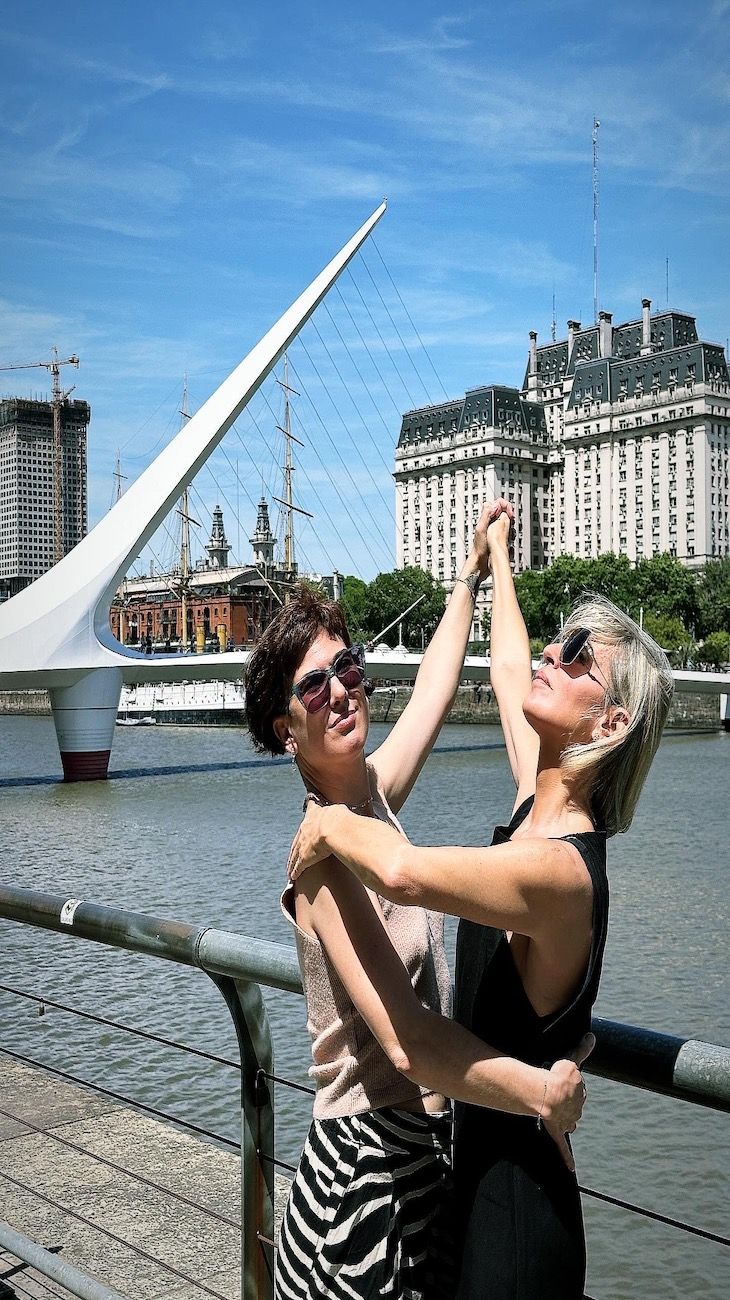
This is your fourth time around in Latin America. You’ve done Mexico City, you've done Bogotá, São Paulo. Now, you’ve made your way over to Argentina during a very unique time…
I mean, we landed on a day when you elected a new president, so you couldn't have more of a moment of change! Actually, that's our producer Nicki Paxman’s big belief: that you need to look for something that's shifting in a city in the world, or something that's recovering. Change always means that there are more stories to tell from different points of view. Nicki always says, "You look for the grit in the oyster that's going to make the pearl," which is what we do. It's so true. If there's something going on that's changing, that's when art becomes really interesting.
How do you go about curating the line-up of artists for the show?
Let's take Buenos Aires. I do a couple of things, personally. I put Google Alerts on things like "Buenos Aires filmmakers, Buenos Aires street artists, Buenos Aires cool people," so every day I get all those emails. After that, on social media, I follow all the hashtags, and soon, a sort of Venn diagram begins to formulate. The names that collect in the middle, you go, "Oh, everyone's talking about this person, or this project." Then, I take up my wishlist to our producer, who by then has found fixers on the ground in the city, and those fixers have also said what's interesting. The ideal scenario is if the fixers’ list has some people that I've chosen, and then we go "Boom! We've got something that everybody is talking about."
Then, of course – and this is such a demand that we put on people everywhere – they need to be able to speak English. You know, people are afraid sometimes to come on that stage and speak in a second, sometimes a third language of theirs. It’s already so remarkable that people will do that. So, we need to find out if they're willing to speak English confidently and also, importantly, they have to have something to say.
I might want some amazing movie star somewhere, but if they've not got very much to say, then it's not going to be interesting to us. Sure, it'll be a big headline name, but if they don't have opinions or their project doesn't really say much, it's not going to add to our show.
Can you talk a little bit about who was onstage for the Buenos Aires edition?
As far as the musicians, we have a legend, Dante Spinetta, who has just won a Latin Grammy this week for one of his songs that he will be performing. We also try to have different sounds on the stage, so in contrast, we have a duo called Fémina, and they use quite traditional folk music but they flip it with hip hop beats. They're two women, and women are very important to be represented.
Then we have female comedian Ana Carolina. She's also gay, and being able to give those communities a voice is also really important. Also, you know, through comedy you can say all kinds of things that nobody else can, because humour is a great vehicle for messaging.
As our guest, we have the filmmaker Benjamín Naishtat, and his films are very interesting. Santiago Mitre was on one of our shows earlier in the year for the UK for Argentina, 1985, and that's what you find: filmmakers are going back and are now able to tell their stories. I think there's been a collective PTSD in a country like Argentina about what happened, so these filmmakers are taking different angles now. It's been quite fascinating to see Benjamín's work. Also because he's Jewish and there's a very interesting Jewish community in Buenos Aires, so again, giving voice to a community who may not necessarily have the star power that other people do.
Then we have an acting star, Delfina Chaves, and she's very interesting because she's a very young and successful actress who has done telenovelas, a Netflix show, and now she's playing Queen Máxima of the Netherlands. There's a lot to explore through a seemingly simple little TV series...but nothing's ever simple.
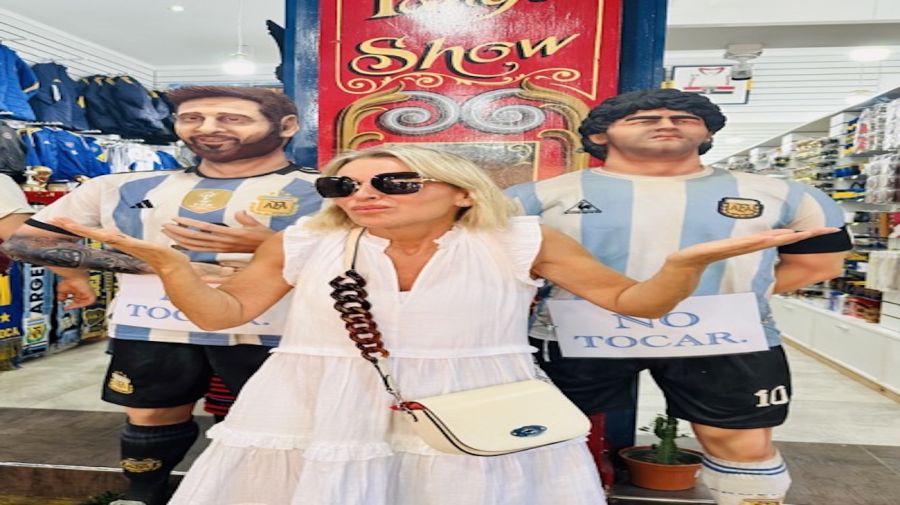
This city has, historically, a very rich culture but particularly, in the past decade or so, I’d say it has garnered such an incredible amount of international attention through chart topping music, feature films, the World Cup was huge obviously, and it’s all in the face of what I understand as some truly tumultuous times politically and economically for the Argentines. How do you think the case of Buenos Aires and Argentina’s cultural prominence speaks to the importance of the arts and what it does for a country?
Well, firstly, it can tell so many stories through words, through visuals. But also, it brings people together. It really does. Thoughts and ideas can be provoked by experiencing a piece of art. It's also interesting what you're saying about the music in Argentina, because the Spanish language music is suddenly a lingua franca that we’ve never experienced before. If I put hits 2023 on Spotify right now, a quarter of that music will be in the Spanish language. And that is incredible! They have not had to suddenly say, "We've got to make this more acceptable to an English-speaking North American audience," so that's really good to see coming through.
But I think all arts and entertainment have the potential to: one, affect change; two, make people think, make people see somebody else's point of view; and three, just make people come together. It sounds a little bit woo-woo and new age, but it's true.









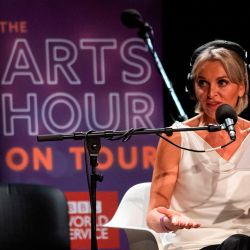


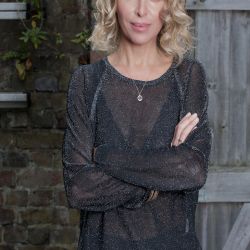



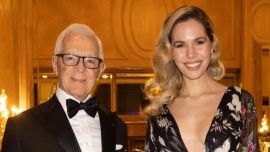






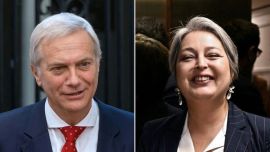
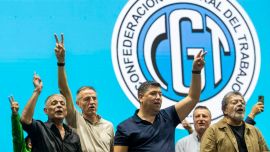

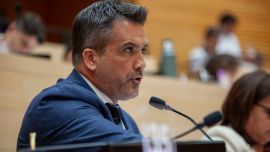
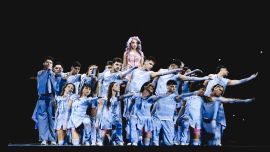
Comments